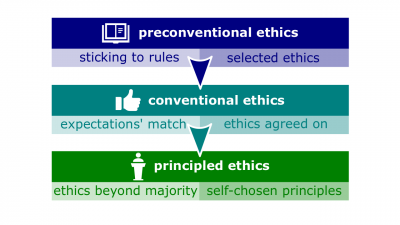Mental-model development
Mental-model development (hereinafter, the Process) is the process of how human beings learn through their social experiences those concepts that are shared with the others and called mental models, as well as a group of theories that conceptualize that process. In fewer words, the Process can be defined as a set of social experiences of learning shared mental models.
The primary purpose of the research into the Process is to design learning experiences and/or sequence them. The research into learning sequences often serve the same purpose.
Moral development
Moral development is the process of how human beings build their ethical behaviors based on their learning experiences, as well as a group of learning sequences and other human-learning theories that conceptualize that process.
- Preconventional level. The lower level of the Model in which a person's choice between right and wrong is based on personal consequences from outside forces or, in other words, is extrinsically motivated. This level consists of two stages: (a) sticking to rules to avoid punishment and (b) following the rules only when doing so is in the person's interest.
- Conventional level. The middle level of Model in which a person's choice between right and wrong relies on maintaining expected standards and living up to the expectations of others, or, in other words, is cooperatively motivated. This level consists of two stages: (a) living up to what the people close to the person expect and (b) maintaining conventional order by fulfilling obligations to which the person agrees.
- Principled level. The upper level of Model in which a person's choice between right and wrong is based on the person's own moral values apart from authority of the groups to which he or she belongs or society in general, or, in other words, is intrinsically motivated. This level consists of two stages: (a) valuing rights of others and upholding absolute values and rights regardless of the majority's opinion and (b) following self-chosen ethical principles even if they violate the law.
